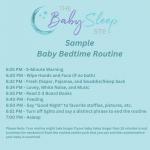The 4 month sleep regression happens around 3 to 4 months old when your baby’s sleep patterns change to be more adult-like (with sleep cycles). As a result, many 4 month old babies wake frequently at night and take short naps leaving themselves and their parents exhausted. Sleep regressions are exhausting but you can help your baby sleep better! Since we have been here for 15+ years, we have helped millions of 4 month olds sleep better! With these tips, you can help your baby stop waking at night and take longer naps.
In this article:
What is The 4 Month Sleep Regression and Why It Happens
The 4 month sleep regression is caused by normal brain development that causes a baby to sleep more like an adult. It usually means your baby is waking up excessively in the middle of the night and taking short naps due to the need to transition from light sleep to deep sleep and back again.
This regression can also be known as the “3-month sleep regression” or the “5-month sleep regression” too, since it starts any time after 12 weeks and usually before 20 weeks old. This is a completely normal time period in your baby’s life and even a good sign that they are developing appropriately!
Signs of the 4 Month Sleep Regression
Signs of the 4-month sleep regression usually include one or more of the following:
- Waking a lot at night (even when they were sleeping in long stretches before!) Waking every 1 to 2 hours at night is common.
- Taking short naps 30-45 minutes long.
- Can’t be put down awake (or even asleep sometimes!) Baby wants to sleep only in your arms or a carrier/sling.
- Irritability and Fussiness (though that can be simply due to sleep deprivation!).
- Needing to be put back to sleep the same way each time (e.g. rocking or feeding back to sleep).
These are the most common signs of the 4 month sleep regression we hear from families reaching out to us.
How Long Does It Last, When Will It End, and Will Your Baby Outgrow It?
The exhausting 4 month sleep regression peaks for around 2-3 weeks. Some babies will begin (or go back to) sleeping well while others have sleep habits that need to be actively changed in order to help them sleep better. The regression doesn’t ever “end” in the strictest sense of the word. The 4 month sleep regression marks a permanent change in your baby’s sleeping habits.
Before your baby hit the 4-month mark, your baby’s sleeping patterns were very simple and straightforward. Newborns sleep deeply much of the time. This explains why many (not all!) newborns and very young infants tend to sleep anywhere, through anything!
After 4 months old, though, baby brains mature and change! Now, babies are cycling between light and deep sleep more often – just like we adults do.
In my experience, babies do NOT generally outgrow the 4 month sleep regression. Habits become more ingrained and I can talk to a parent on the phone with an 8 month old or an 18+ month old with similar sleep problems! I recommend you be proactive in helping your baby sleep better. Otherwise, both you and your baby will lose out on hours of very important sleep!
10 Tips to Help Your 4 Month Old Sleep Better and Stop Waking at Night
Although your baby is young and going through a developmental leap, it’s still possible to improve their sleep. Establishing healthy sleep habits from a younger age will give you and your family lots of happiness! Here are my top 10 tips to help your 4 month old baby sleep better and stop waking at night:
1. Follow the Right Schedule – Set Baby Up for Success
Overtired babies have the most difficulty falling asleep and staying asleep. The #1 thing you can do is put your baby on an age-appropriate 4-month old schedule even if it isn’t strict. You can base the schedule on wake windows, instead, for example. Having a baby on the wrong sleep schedule is often disastrous for sleep! I can’t tell you how many people I have helped just by giving them a better schedule for their unique baby.
2. Follow a Consistent Bedtime Routine
One of the first things you might hear is to create a bedtime routine for your baby. A bedtime routine is a series of steps leading up to your baby falling asleep. However, what’s important about a bedtime routine is that it’s consistent so your baby knows what to expect. This is especially important for babies who aren’t as easy-going and adaptable.

3. Offer the Right Number of Night Feedings
One thing that surprises parents is that many babies still need night feedings at 4 months old. What might look like the 4 month sleep regression could simply be that your baby needs more breastmilk or formula than they are currently getting. This is a common age for bottle sizes to increase or milk supply needs to increase for breastfeeding mothers. As babies become more mobile, they need more calories! Be sure to look at our baby feeding chart to determine if your baby is getting enough.
4. Consider a Dream Feed
If your baby can’t get all of their milk in during the day, a good solution is sometimes a dream feed. This is a way to give your baby a feeding at night without disrupting your own sleep.
5. Stop Swaddling and Use a Sleep Sack
During the 4 month sleep regression, your baby will likely start rolling and/or breaking out of the swaddle. This is a great time to stop swaddling your baby and transition to a sleep sack for baby.
6. Change Your Baby’s Sleep Associations
We all have something that helps us sleep such as a blanket, a pillow, the TV, etc. If your baby’s sleep associations involve something you are doing such as rocking, feeding, or bouncing, this will often cause more frequent night-waking. Make sure your baby’s sleep associations allow them to sleep independently as much as possible/appropriate for their age.
7. Put Your Baby Down Drowsy, But Awake
One way to help your baby sleep better at night is to help them be able to put sleep cycles together. We actually expect babies to wake up at night. As long as they know how to go to sleep in the first place, they should be able to master going back to sleep. This allows them to sleep in longer stretches. The first step in doing so is putting them down drowsy, but awake and letting them fall the rest of the way to sleep in the same place and manner in which they will wake up after their sleep cycles.
Of course, when you put your baby down awake, they might not like it, might protest, and might cry! If that’s the case, you may need to consider sleep training or gentle sleep coaching. In no time, you’ll have a baby sleeping through the night!
8. Set the Proper Sleep Environment
Can you sleep in a crowded bus station, with a movie blaring on the television or in a very hot room? A proper sleep environment is one piece of the puzzle that will help your baby sleep better. Here are a few things to consider in your baby’s sleep environment:
- Blackout Curtains or Blinds – Some babies are sensitive to light and will take better naps in a darkened room.
- Room Temperature – The ideal room temperature for sleep is between 68 and 70 degrees Fahrenheit or 20-21 degrees Celsius
- White Noise – Some babies are sensitive to noises in the house especially when they nap. The monotony of white noise can help keep baby asleep longer.
- Crib Toys – Help make the crib less like a jail and more of a welcoming place with crib toys and mobiles.
- Lovey – Although babies should not sleep with anything loose in the crib until they are a year or older, a lovey can help them feel more secure.
If you’re having trouble getting your baby to sleep in the crib, be sure to read our tips here: How to Get Baby to Sleep in a Crib and How to Get Baby to Nap in the Crib.
9. Avoid Naptime Mistakes
You’d be surprised at how many naptime mistakes parents make such as dropping a nap too soon. Make sure you’re not one of them!
10. Be Consistent
Establishing new habits takes approximately 30 days for all of us. Remember, your baby is young and wasn’t born knowing the value of healthy sleep habits. Your consistency will pay off in the end!
Will There Be More Sleep Regressions?
Yes, babies and toddlers have several sleep regressions at various ages. The 4 month sleep regression is one of the most disruptive followed by the 8 to 10-month old regression. While each sleep regression lasts 3 to 6 weeks, on average, it’s possible to continue to give your child the gift of sleep!
4 Month Sleep Regression FAQ
Yes, the 3-month sleep regression is the same as the 4-month sleep regression. 3 month olds sometimes stop sleeping through the night and fight sleep. Your baby is simply developing early in this area. Most babies experiencing this regression are between 12 and 20 weeks old.
Yes, all babies develop at their own rates. So, while 4 months is the most common age to start this regression, some babies will be 5 months old. This is actually favorable because babies who are a little older are usually more ready to be unswaddled and learn how to self-soothe.
Not necessarily. All babies will go through the development that leads to 4 month olds waking a lot at night but some babies will continue to sleep through the night anyway!
Yes, if you follow an age-appropriate schedule and practice putting your baby down drowsy, but awake, it’s possible that you can avoid this regression altogether.
Some people don’t like the name “regression” since it represents development forward NOT backward! Whether you call it a regression or a progression, it is a very common time period for babies to wake up a lot at night and take short naps. For that reason, it isn’t a “myth.”
If you can’t put your baby down at all, this usually means YOU are your baby’s “mattress” so to speak. Help your baby get used to being put down and lay flat during the day, first, and then practice at bedtime ONLY, at first. You will be able to add more sleep periods as they get used to it.
In my experience, waking frequently due to a sleep regression means waking every 1-2 hours. If your baby is waking up every 20-30 minutes, I recommend you visit your healthcare provider.


